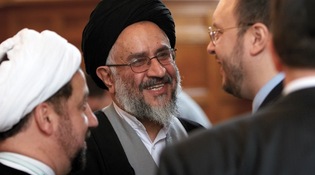 loading
loading
featuresLove thy neighborAyatollahs, evangelicals, shaykhs, and rabbis meet at Yale to ask: can we all just get along?  Bob HandelmanConference participants included Ayatollah Ahmad Iravani, head of Islamic Studies at the Catholic University of America, and Ayatollah Damad, head of Islamic Studies at the Academy of Sciences of Iran, talking with Rev. Joseph Cumming of Yale. View full imageWhen Pope Benedict XVI gave a speech in September 2006 suggesting that Islam condones violence, Western media homed in on the angry responses and fevered demonstrations by some Muslims. One year later, when 138 prominent Muslim clerics and scholars issued a letter asking for a dialogue between Muslims and Christians—partly in response to the Pope's address and the ensuing uproar—they got scant attention. The press and many religious Americans have long considered interfaith discussions to be public-relations ploys or feel-good gabfests. But the October 2007 letter, "A Common Word between Us and You," brought together leaders from around the world and across Islam's often-fractious sects, many with millions of followers, and it countered those who assert that moderate Muslims are silent about violence. At the Yale Divinity School's Center for Faith and Culture, director Miroslav Volf and others immediately understood that the letter was a breakthrough invitation that had to be seized. Within days, the Divinity School published a response on the center's website. In November, that response, "Loving God and Neighbor Together," ran as a full-page ad in the New York Times. It was eventually signed by 500 Christian leaders and scholars from 37 countries, including well-known evangelicals like Rick Warren and Jim Wallis. Yale's quick embrace of dialogue with Muslim leaders led to a week-long conference at the Yale Law School this past July of about 140 religious leaders, mostly Christians and Muslims. The conference was the first in a series of events over the coming year that will take place at Cambridge University, the Vatican, and Georgetown University, and in Jordan. Participants called this conference—entitled "A Common Word: Loving God and Neighbor in Word and Deed"—a "first date." They hope for a long courtship that will bring Muslims and Christians to a better understanding of one another, as a generation of interfaith work between Jews and Christians has done. But as first dates go, it was uncharacteristically hard-nosed. Muftis and ministers delved into theological differences, each group pointing out that the other often misunderstands tenets and priorities of its faith. At workshops, talks, and meals, and next to one another on the treadmill, they tackled thorny issues, such as Christian missionary work in Muslim lands and the treatment of Christians in majority-Muslim states. "A lot of interfaith meetings are effete academics talking about things that don't really mean anything," says Caner Dagli, assistant professor of religious studies at Holy Cross College in Massachusetts and one of the Muslim participants. "Now, you have real authorities signing documents. These people have political power, not directly, but because they have constituencies." Now that the conference is over, the task before the participants, besides continuing and broadening the discussion, is to tell their followers that it is possible to talk with the other side—that the other side may, in fact, share a great deal with one's own side. But after years of animosity, many of those followers may not want to hear the message.
|
|